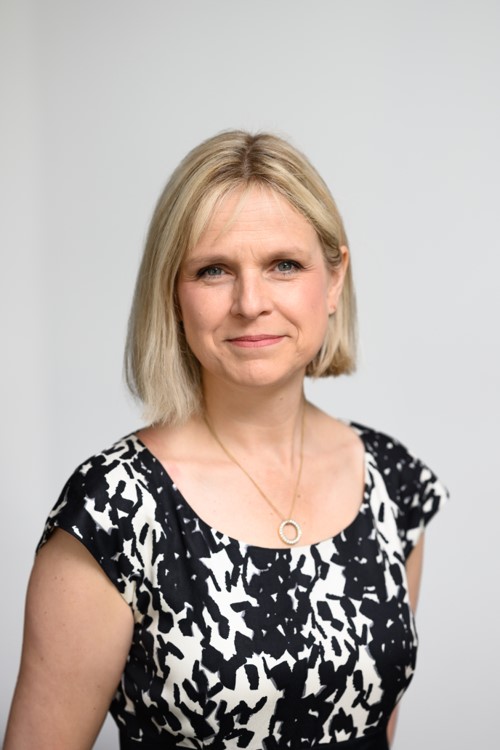Clinical Lead of ChatHealth, Laura Burrowes, joined the Digital Health Transformation Service at Leicestershire Partnership NHS Trust’s (LPT) in April 2022, following a career as a school nurse, where she was the lead practitioner for the confidential text messaging service for the school nursing service in Manchester.
Nationally, the award-winning text messaging service has been adopted by more than 70 NHS Trusts and healthcare organisations. It’s available to more than 2.8 million young people and the parents and carers of over 3.9million children in England, Wales and Northern Ireland, providing school nursing, health visiting, sexual health, perinatal mental health and young people’s mental health services.
Last year, ChatHealth won two awards at the Innovate Awards including the ‘winner of winners’ accolade. Back for 2023 and open for entries, the Innovate Awards celebrate innovation in health and care and are delivered collaboratively between the AHSN Network and NHS Confederation.
Tell us a little bit about your innovation. The what and the why?
Back in 2012, my colleagues at LPT recognised a change was needed in the way some service users were communicated with, especially young people and millennial parents.
Young people told us they wanted to be able to communicate discreetly, without fear of judgement, whilst parents and carers said they struggled to get in touch or worried about wasting professionals’ time.
Smartphones are such an important part of many of our daily lives now and messaging is the most popular way for people to digitally communicate with friends and family – people don’t often pick up the phone anymore. So, it made sense to explore a digital messaging service.
We initially examined several off-the-shelf solutions, however, we weren’t able to find one that fulfilled all of our requirements, so we went ahead with developing our own bespoke web-based messaging platform to receive and respond to text messages, and ChatHealth was born.
After successfully piloting large-scale messaging services for young people to reach school nurses in Leicestershire, we soon received interest from other NHS and healthcare organisations seeking to solve the same problem, this was closely followed by the provision of a messaging service for parents and carers to communicate with health visitors.
Which AHSNs have you been supported by?
We’ve connected with 14 of the 15 AHSNs and The Innovate Awards helped us with some of those connections.
East Midlands AHSN have been instrumental to the growth and spread of the service and we’ve achieved 100% uptake in public health services in the East Midlands, East of England, Oxfordshire and in Kent, Surrey and Sussex.
The Innovate Awards came at the right time as we were looking for opportunities to help spread ChatHealth across the NHS and it opened up conversations and connections with other AHSNs. It gave us the exposure we wanted and lots of opportunities have come our way since winning our own category and the ‘winner of winners’ title.
What’s been your toughest obstacle to date then?
The biggest barrier is actually at times ChatHealth’s success. The service’s foundations are within school nursing, and it’s been so successful in that arena that as a school nurse myself by background, I don’t think there’s a school nurse in the country that doesn’t know about it. However, we’re keen for other practitioners to see that it can be used in a range of health care services where you need regular contact with service users, such as with those with diabetes or epilepsy.
My personal obstacle in my job role is sometimes with encouraging practitioner engagement, as it can be a barrier for practitioners to work in such a different way. Most people go into healthcare professionals to have that traditional face-to-face contact with patients, which creates job satisfaction. Using a different format such as a messaging service can be a big transition for some practitioners. We recognise and understand this, therefore, a big part of my role is to show practitioners just how vital ChatHealth can be and support them on that journey.
What are your hopes for the future?
The hopes for the future are to continue to expand, particularly in specialist areas such as children’s diabetes and epilepsy services where we’re supporting some teams and we’ve seen the potential of ChatHealth.
We’re also growing in health visiting, sexual health, perinatal mental health and young people’s mental health services. Opportunities such as the Innovate Awards have helped give us exposure and open up conversations with the right people to help do that. I’ve personally been invited to speak at a Yorkshire and Humber AHSN webinar about health inequalities, and that’s allowed us to give a voice to some of our service users who otherwise wouldn’t have one and show the real impact of ChatHealth to a new audience.
What’s the best part about your job?
The best part of my job is observing the results of a new implementation within an organisation. During our post-implementation catch-up calls, we often hear such positive feedback. I just love these calls because they’re so positive and the teams have so much energy. Hearing the excitement in their voices about the first message they have received and how they responded and supported the service user is a fantastic feeling. I’m still a nurse at heart and I always will be, so I love hearing those stories and hearing how the service has impacted service users’ lives.
What are your three pieces of advice for budding innovators?
- Striving to make change or push an idea can be a lonely place, so I think it’s important to have someone professionally and personally that you can speak to, and make sure you reach out to them when you need to.
- Be passionate, because that’ll inspire passion in other people. And most importantly, don’t lose it!
- It’s hard to blow your own trumpet but it’s so important to celebrate your successes, no matter how small and to shout about them!
What do service users say?
“It has made me feel more at ease. I feel like I can easily talk about the way I feel and not be judged.”
“It’s good to know that there is someone that will listen. It helps me to feel like I’m less alone and that I have people to talk to even when I feel like I don’t.”
Find out more about the Innovate Awards 2023 and enter your or your teams innovation.

The government has set out three shifts it wants to see happen: treatment to prevention, hospital to community, analogue to digital. HealthTech has a crucial role in supporting the delivery of all three. But using technology to help deliver these changes requires procuring the technology, and when all the noise is about there being no [...]

Dr Anish Bhuva, is the founder of Pace MRI, a Consultant Cardiologist at Barts Heart Centre and an Associate Professor at University College London. Tell us about the innovation. What does it do, how does it help, who does it help and why is it important? Pace-MRI is an award-winning digital tool that manages complex [...]

As we celebrate International Women’s Day, Anna King, Commercial Director at Health Innovation Network South London, identifies how FemTech is 'Accelerating Action' in UK healthcare and driving economic growth. In recent years, FemTech - the sector focused on women’s health and wellness technology - has gained significant traction globally. In the UK, this growing sector [...]









